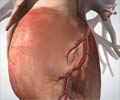According to a study based from University of Chicago longer sleep durations can reduce a person's risk of coronary artery calcification.
A new study from the University of Chicago suggests that longer sleep durations can reduce a person's risk of coronary artery calcification, which is thought to be a predictor of future heart disease.
Published in the journal JAMA, the study report said that the participants who slept on average an hour longer per night than others had an associated lower incidence of coronary artery calcification.Lead researcher Christopher Ryan King revealed that the study included 495 participants from the Coronary Artery Risk Development in Young Adults (CARDIA) study, who were black and white men and women age 35-47 years.
None of the participants had coronary calcification at the beginning of the study in 2000-2001, as shown by computed tomography scans.
Following the participants for five years, the researchers observed that sleeping an extra hour per night decreased the estimated odds of calcification by 33 percent.
"We have found a robust and novel association between objectively measured sleep duration and 5-year incidence of coronary artery calcification," the authors write.
"This study further demonstrates the utility of a simple objective measure of sleep that can be used at home. Future studies will be needed for crucial extensions to these results. First, these results need confirmation in other cohorts. Second, does sleep moderate the rate at which calcification accumulates? Third, will objective sleep tie to coronary disease event outcomes over the long term? While calcification predicts such outcomes, it is difficult to know how and if the predictors of calcification themselves will determine outcomes, or if their impact will be purely mediated by their effect on calcification. Finally, if this association is born out, interventional studies will be needed to guide clinical advice," they add.
Advertisement
PRI/L














